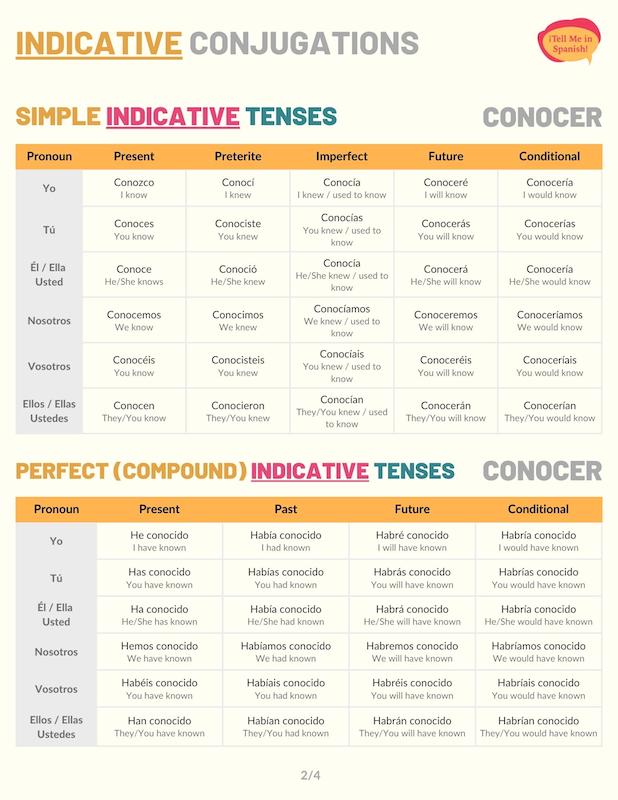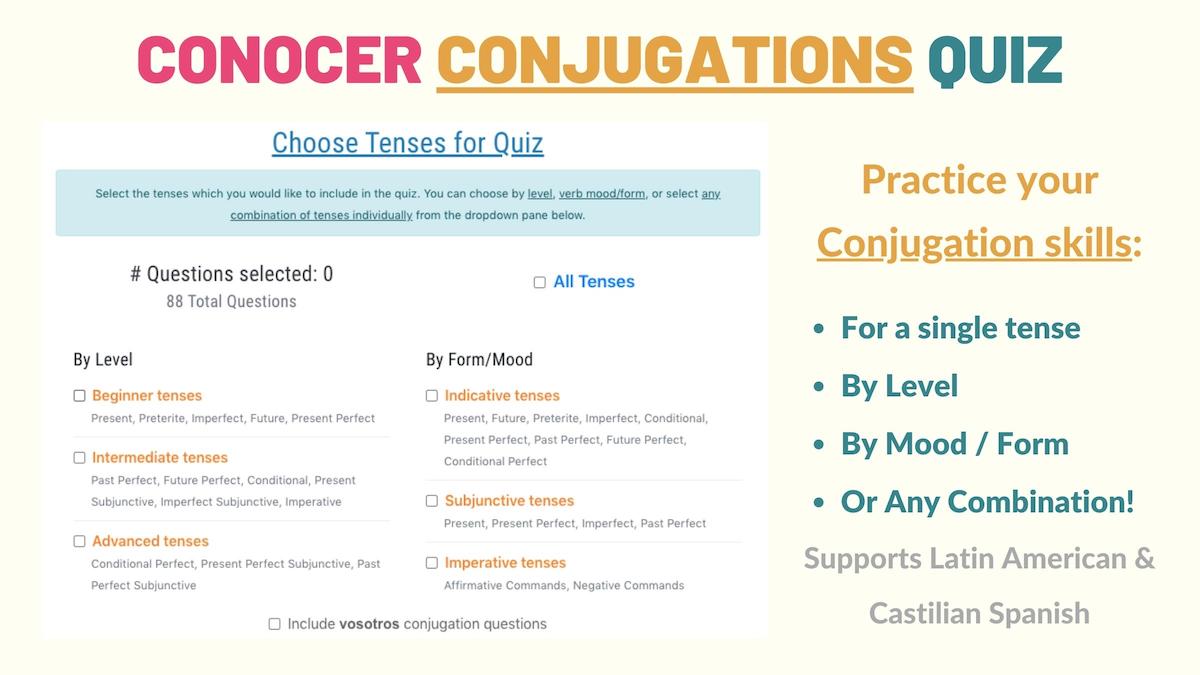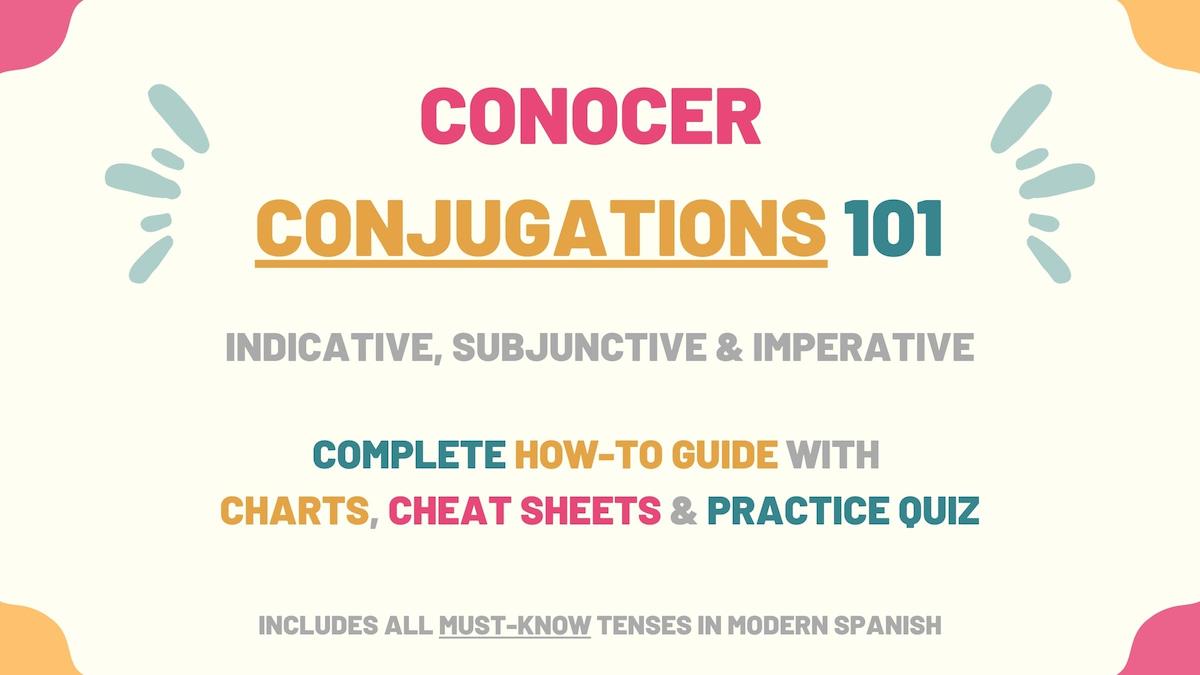Conocer is an -ER verb with consonant changes. Since many verbs ending in –cer follow this pattern, in this guide, we’ll go over the most important conocer conjugation charts. Here is a summary of what we’ll cover:
- Conocer Overview
- Indicative Tenses of Conocer Conjugations
- Subjunctive Tenses of Conocer Conjugations
- Imperative (Commands) of Conocer Conjugations
- Uses & Examples
- Download Conocer Conjugation Tables & Uses Cheat sheets
- Conocer Conjugation Practice Quiz
‘Conocer’ can be translated as ‘to meet’, ‘to know’, or ‘to be familiar with’, among other applications. The conocer conjugation charts below only have one translation to keep the tables as organized as possible. To learn more about the meanings of ‘conocer’, go to the section Uses & Meanings.
Overview of Conocer
| Verb Characteristic | Property |
|---|---|
| Verb Type | -ER |
| Irregular | No |
| Infinitive | Conocer |
| Gerund (Present Participle) Form | Conociendo |
| Past Participle Form | Conocido |
| Synonyms | Saber, entender, relacionarse. |
Stem Changes: -CER to ZC
- Present Indicative: conozc only for ‘yo’.
- Present Subjunctive: conozc for all subject pronouns.
- Affirmative Imperative: conozc for ‘usted’ and ‘ustedes’.
- Negative Imperative: conozc for all subject pronouns.
Indicative Conjugations of Conocer
Present tense
The conocer present tense conjugation for the subject pronoun ‘yo’ has a -CER to -ZC change. These conjugations express that a person knows someone or is familiar with something. For instance: ¿Ustedes conocen a esa chica?
| Person | Conjugation | Translation |
|---|---|---|
| Yo | Conozco | I know |
| Tú | Conoces | You know |
| Él / Ella Usted | Conoce | He/She knows You (formal) know |
| Nosotros | Conocemos | We know |
| Vosotros | Conocéis | You know |
| Ellos / Ellas Ustedes | Conocen | They know You (plural) know |
Preterite tense
Conocer preterite conjugations are regular. Conjugate this verb to the Spanish past preterite to convey that a person met someone. You can use adverbs of time to point out the specific moment when this action occurred. For example: Ayer, conocí a la chica nueva.
| Person | Conjugation | Translation |
|---|---|---|
| Yo | Conocí | I knew |
| Tú | Conociste | You knew |
| Él / Ella Usted | Conoció | He/She knew You (formal) knew |
| Nosotros | Conocimos | We knew |
| Vosotros | Conocisteis | You knew |
| Ellos / Ellas Ustedes | Conocieron | They knew You (plural) knew |
Imperfect tense
When conjugated to the past imperfect tense, conocer expresses that, until now, someone didn’t know a person or a place. You can also use this tense to say that you used to know a person for an extended period of time in the past. For example: No conocíamos este lugar.
| Person | Conjugation | Translation |
|---|---|---|
| Yo | Conocía | I knew I used to know |
| Tú | Conocías | You knew You used to know |
| Él / Ella Usted | Conocía | He/She knew He/She used to know You (formal) knew You (formal) used to know |
| Nosotros | Conocíamos | We knew We used to know |
| Vosotros | Conocíais | You knew You used to know |
| Ellos / Ellas Ustedes | Conocían | They knew They used to know You (plural) knew You (plural) used to know |
Near future
To conjugate to the immediate future in Spanish, use the present forms of ir + a + infinitive verb (conocer, for this guide). These conocer conjugations convey that someone will meet someone or become familiar with a place soon in the future. For instance: En unos días, voy a conocer a mis suegros.
| Person | Conjugation | Translation |
|---|---|---|
| Yo | Voy a conocer | I’m going to know |
| Tú | Vas a conocer | You’re going to know |
| Él / Ella Usted | Va a conocer | He/She is going to know You (formal) are going to know |
| Nosotros | Vamos a conocer | We’re going to know |
| Vosotros | Vais a conocer | You’re going to know |
| Ellos / Ellas Ustedes | Van a conocer | They’re going to know You (plural) are going to know |
Future simple tense
When conjugated to the Spanish future tense, this verb expresses that someone will meet a person or be familiar with a place at some point in the future. Algún día, conoceremos a nuestro escritor favorito.
| Person | Conjugation | Translation |
|---|---|---|
| Yo | Conoceré | I will know |
| Tú | Conocerás | You will know |
| Él / Ella Usted | Conocerá | He/She will know You (formal) will know |
| Nosotros | Conoceremos | We will know |
| Vosotros | Conoceréis | You (formal) will know |
| Ellos / Ellas Ustedes | Conocerán | They will know You (plural) will know |
Conditional tense
In the Spanish conditional tense, conocer is used to express that a person would know someone or a certain place. Si la viera en la calle, no la conocería.
| Person | Conjugation | Translation |
|---|---|---|
| Yo | Conocería | I would know |
| Tú | Conocerías | You would know |
| Él / Ella Usted | Conocería | He/She would know You (formal) would know |
| Nosotros | Conoceríamos | We would know |
| Vosotros | Conoceríais | You would know |
| Ellos / Ellas Ustedes | Conocerían | They would know You (plural) would know |
Present perfect tense
The present forms of haber + the past participle of ‘conocer’ is the structure you must use to conjugate this verb to the present perfect indicative tense in Spanish. These conjugations convey that someone has or hasn’t known a place or met someone.
For instance: Todavía no hemos conocido a tu novia.
| Person | Conjugation | Translation |
|---|---|---|
| Yo | He conocido | I have known |
| Tú | Has conocido | You have known |
| Él / Ella Usted | Ha conocido | He/She has known You (formal) have known |
| Nosotros | Hemos conocido | We have known |
| Vosotros | Habéis conocido | You have known |
| Ellos / Ellas Ustedes | Han conocido | They have known You (plural) have known |
Past perfect
When conjugated to the past perfect tense, conocer expresses that a person had or hadn’t met someone or known a place until this point. For instance: Nunca había conocido a alguien tan simpático.
To form this perfect tense, conjugate haber to the imperfect tense and use the past participle form of conocer.
| Person | Conjugation | Translation |
|---|---|---|
| Yo | Había conocido | I had known |
| Tú | Habías conocido | You had known |
| Él / Ella Usted | Había conocido | He/She had known You (formal) had known |
| Nosotros | Habíamos conocido | We had known |
| Vosotros | Habíais conocido | You had known |
| Ellos / Ellas Ustedes | Habían conocido | They had known You (plural) had known |
Future perfect
In the future perfect tense, conocer communicates that someone will have met a person or known a place by or before a specific time frame in the future. These conjugations also allow you to talk about what or whom someone might have known.
For instance: En unos días, habré conocido a toda la familia de mi novio.
| Person | Conjugation | Translation |
|---|---|---|
| Yo | Habré conocido | I will have known |
| Tú | Habrás conocido | You will have known |
| Él / Ella Usted | Habrá conocido | He/She will have known You (formal) will have known |
| Nosotros | Habremos conocido | We will have known |
| Vosotros | Habréis conocido | You will have known |
| Ellos / Ellas Ustedes | Habrán conocido | They will have known You (plural) will have known |
Conditional perfect
Use conocer in the conditional perfect tense to say that someone would have known a place or met a person if a past condition had been fulfilled. For example: Si hubieras venido, habrías conocido a mi novia.
| Person | Conjugation | Translation |
|---|---|---|
| Yo | Habría conocido | I would have known |
| Tú | Habrías conocido | You would have known |
| Él / Ella Usted | Habría conocido | He/She would have known You (formal) would have known |
| Nosotros | Habríamos conocido | We would have known |
| Vosotros | Habríais conocido | You would have known |
| Ellos / Ellas Ustedes | Habrían conocido | They would have known You (plural) would have known |
Progressive tenses
The progressive tenses in Spanish are formed by using estar conjugations and conocer’s present participle form. Use these forms to indicate that a person is meeting someone or becoming familiar with a place at the moment of speaking. Mi mamá está conociendo a mis amigos.
| Progressive Tense | Formula | Translation Example |
|---|---|---|
| Present | Estar (present) + conociendo | I am knowing |
| Preterite | Estar (preterite) + conociendo | You were knowing |
| Imperfect | Estar (imperfect) + conociendo | He was knowing |
| Future | Estar (future) + conociendo | We will be knowing |
| Conditional | Estar (conditional) + conociendo | They would be knowing |
Conocer Subjunctive Conjugations
In Spanish, the subjunctive tenses are used to refer to wishes, requests, suggestions, expectations, doubts, or hypothetical situations. In the sections below, you’ll find conocer conjugation charts for the most common subjunctive tenses.
Present subjunctive
Conocer subjunctive conjugations have a -CER to ZC change for all subject pronouns to keep pronunciation consistent. When conjugated to the subjunctive tense, conocer is used to wish or request someone to meet another person or place.
For example: Quiero que conozcan a mi esposo.
| Person | Conjugation | Translation |
|---|---|---|
| Yo | Conozca | I know |
| Tú | Conozcas | You know |
| Él / Ella Usted | Conozca | He/She knows You (formal) know |
| Nosotros | Conozcamos | We know |
| Vosotros | Conozcáis | You know |
| Ellos / Ellas Ustedes | Conozcan | They know You (plural) know |
Present perfect subjunctive
Haber conjugated to the present subjunctive + conocido (past participle) is the structure to form the present perfect subjunctive. Use these conjugations to wonder, express doubt, or wish that someone has already met or known a person or place.
For instance: Dudo que hayan conocido a la maestra Cristina.
| Person | Conjugation | Translation |
|---|---|---|
| Yo | Haya conocido | I have known |
| Tú | Hayas conocido | You have known |
| Él / Ella Usted | Haya conocido | He/She has known You (formal) have known |
| Nosotros | Hayamos conocido | We have known |
| Vosotros | Hayáis conocido | You have known |
| Ellos / Ellas Ustedes | Hayan conocido | They have known You (plural) have known |
Imperfect subjunctive
In the imperfect subjunctive, conocer allows you to discuss past suggestions, requests, and wishes related to someone knowing a place or person. For example: Me hubiera gustado que conocieras a mi mejor amiga.
Depending on whether you speak Latin American or Castilian Spanish, the imperfect subjunctive tense has two conjugation models:
Latin American Spanish version
| Person | Conjugation | Translation |
|---|---|---|
| Yo | Conociera | I knew |
| Tú | Conocieras | You knew |
| Él / Ella Usted | Conociera | He/She knew You (formal) knew |
| Nosotros | Conociéramos | We knew |
| Ellos / Ellas Ustedes | Conocieran | They knew You (plural) knew |
Note: In Latin American Spanish, the subject pronoun ‘vosotros’ is not used. As a result, the conocer conjugation for that ‘vosotros’ has been omitted from the chart above.
Castilian Spanish version
| Person | Conjugation | Translation |
|---|---|---|
| Yo | Conociese | I knew |
| Tú | Conocieses | You knew |
| Él / Ella Usted | Conociese | He/She knew You (formal) knew |
| Nosotros | Conociésemos | We knew |
| Vosotros | Conocieseis | You knew |
| Ellos / Ellas Ustedes | Conociesen | They knew You (plural) knew |
Past perfect subjunctive
Conocer past perfect subjunctive conjugations express that someone would have known a person or place if a past circumstance or condition had taken place. We can also use these forms to express regrets about knowing a person.
For example: Ojalá nunca te hubiera conocido.
| Person | Conjugation | Translation |
|---|---|---|
| Yo | Hubiera conocido | I had known |
| Tú | Hubieras conocido | You had known |
| Él / Ella Usted | Hubiera conocido | He/She had known You (formal) had known |
| Nosotros | Hubiéramos conocido | We had known |
| Vosotros | Hubierais conocido | You had known |
| Ellos / Ellas Ustedes | Hubieran conocido | They had known You (plural) had known |
Conocer Imperative Conjugations
The Spanish imperative mood or commands are used to instruct people to perform or not perform an action.
Affirmative commands
Conocer affirmative imperative conjugations have a -CER to -ZC change for the third-person singular and plural. Check these forms in the conocer conjugation chart below. These commands are used to compel people to know a place or person.
For example: Antes de que la juzgues, conócela.
| Person | Conjugation | Translation |
|---|---|---|
| Tú | Conoce | Meet |
| Usted | Conozca | Meet |
| Vosotros | Conoced | Meet |
| Ustedes | Conozcan | Meet |
Negative commands
The negative imperative of conocer is formed with the stem conozc. Even though these forms can be used to order someone not to meet a person or become familiar with a place, they’re not very common in conversations.
| Person | Conjugation | Translation |
|---|---|---|
| Tú | No conozcas | Don’t meet |
| Usted | No conozca | Don’t meet |
| Vosotros | No conozcáis | Don’t meet |
| Ustedes | No conozcan | Don’t meet |
Meanings of Conocer & Examples
Since we’ve just learned how to conjugate conocer, here are some examples of how to apply this verb to your Spanish conversations.
- Talking about meeting/knowing someone
(Object pronoun) + [conocer conjugated] + a + (noun)
Creo que no la conozco. ¿Cómo se llama?
I don’t think I know her. What’s her name?
En unos días, conoceremos a nuestros vecinos.
We will meet our neighbors in a few days.
Take Note: Use direct object pronouns in Spanish to replace the person someone knows. However, if you’re expressing that two people know each other, you should use reflexive pronouns to convey reciprocity.
- Expressing your familiarity with a place
[Conocer conjugated] + [determiner] + [noun]
¿Ya conocen este restaurante?
Do you guys already know this restaurant?
No conocía esta canción, es muy bonita.
I didn’t know this song; it’s very nice.
Take Note: Because they’re both translated as ‘to know’, conocer and the verb saber are usually confused. However, you should take the time to understand how saber vs conocer work.
Download Conocer Conjugation Charts & Uses Cheat sheet

Conocer is a must-know -ER verb in Spanish as it’s used on a daily basis. It can also be tricky for Spanish beginners to learn to conjugate since it’s a stem-changing verb. I’ve created a cheat sheet PDF you can download containing the conocer conjugation charts as well as its definitions and example uses so you can refer back to it when you need to.
Practice Quiz: Conocer Conjugation

Now that you’ve seen how to conjugate this important -ER verb, the next step is to take the conocer conjugation practice quiz. You can choose which tenses to practice and learn its stem changes.



